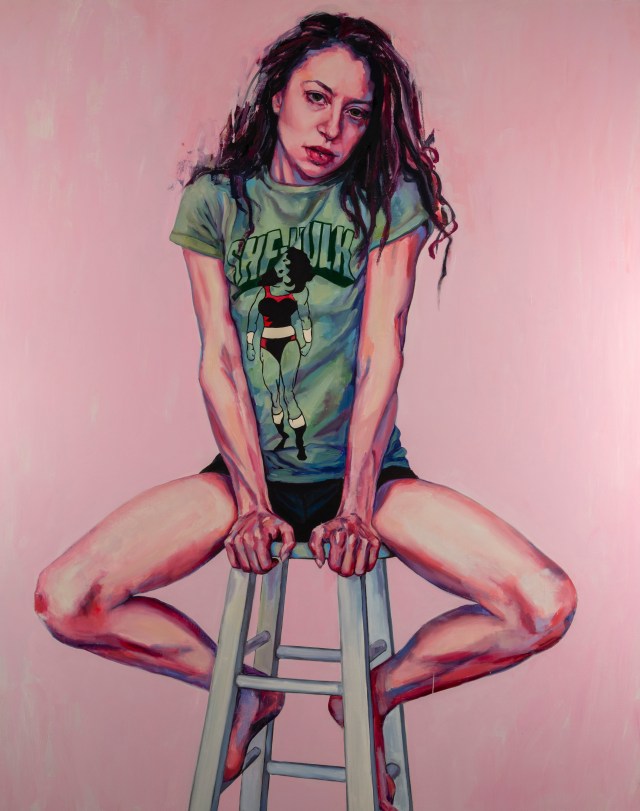Subscribe: Apple Podcasts | Spotify | TuneIn | RSS | Click here to join mailing list

Sarah Stolar (b. 1974, Chicago, IL) is an interdisciplinary artist who lives in Santa Fe, New Mexico. Working from a vast technical perspective, the breadth of her work includes painting, drawing, multi-media installation, film, video and performance art. Rooted in a 20-year investigation of the female psychological narrative, common threads in her work include coming of age, loss of innocence, sexuality, beauty, power, death, spirituality, and identity. Sarah is the daughter of artist and educator Merlene Schain, and in the family lineage of 19th-century German painter Adolph von Menzel and Rookwood Pottery master potter John von Menzel of the American Arts and Crafts Movement. She grew up in her mother’s art studio and award-winning art school Schain Studios in Cincinnati, OH, received a BFA in Painting from the Art Academy of Cincinnati, and an MFA in New Genres from the San Francisco Art Institute. Sarah’s visual art, performance, and collaborative work have exhibited across the United States and in Argentina, Spain, Germany, Austria, Finland, Italy, and Cuba with solo exhibitions at the New Mexico Museum of Art, Harwood Museum of Art, and BGMoCA in Montevideo, Uruguay as well as awards and honors from international film festivals, et al. Her work has been featured in multiple publications including The Nation Magazine, LandEscape Art Review, Nomos Journal, and Hyperallergic. A committed educator for over fifteen years, Sarah Stolar serves on multiple boards and academic committees, and is currently the Chair of the Art Department at the University of New Mexico – Taos.











Must reply to express thanks for this wonderful interview with Sarah Stoler. Wowed by the cultural possibilities and ramifications of her vision. Years ago in Africa I keened with women in my village as children died during a measles epidemic. And have personally indulged in the practice at a time loss. Listened to the whole interview and appreciated your questions Brainard, partly due to the synchronicity with my current death related work, but it was much more.
Bravo re your discussion of the postpartum, post project,’blues’. You are doing everyone, including partners and friends of artists a favour bringing this forward. It’s a common experience and helpful to be aware of it.
Brings back a vivid memory, if you’ll indulge me.
At eight yrs old I gathered a group of neighbourhood kids who wanted to build a fort as a club house. Conveniently there was a vacant lot on the street, and for several days 4-6 of us worked, dreamt and struggled to create a ramshackle structure. Then the moment of elation, we sat in a circle together laughing and peering through propped sticks and grass. We played till our mothers called us home at sunset. Yet by the next day it was all clearly over. Others wanted in, arguments ensued.The fort stayed empty. No shared vision, nothing to look forward to, without a dream, the let-down heavy.. palpable.
No doubt most of us are familiar with this sequence and know the experience well. You and Sarah hit a nerve. Great to be reminded how close that nerve is to the surface. Thanks!
[…] Sarah Stolar spoke to us from Santa Fe, New Mexico where she lives and works. She is currently ending a multi-year interdisciplinary project and looking forward to starting fresh. Moving forward she envisions an interdisciplinary project exploring the five stages or grief, death rituals and keening women, women who are either hired or, of their own accord, mourn on behalf of a grieving family. The tradition can be traced back to the Greco-Roman era. Stolar was about to embark on a trip to Ireland to research keening women there when we spoke. Her interest lies in the evolution to the merry wake, a jovial party that happens in the presence of the deceased that includes rich foods and sex. Stolar imagines this project as a seedy dark underworld and her working title is The Grief Club. To hear more about her vision as this project takes shape, listen to the complete interview. […]